When you hear the term “cholesterol,” what comes to mind first? For most people, it might be a blocked artery or the scolding doctor advising you to change your diet. However, cholesterol isn’t necessarily your enemy. In fact, your body requires it to create cells, as well as to manufacture vitamins and hormones. The problem arises when cholesterol levels get too high, particularly the so-called “bad” cholesterol.
If you’re told that you need to adjust your cholesterol levels, don’t panic. You don’t necessarily have to resort to medication. There are plenty of natural, sustainable, and effective ways to lower cholesterol. In this post, we’ll dive into the most significant factor in this process—what you eat. After all, food is often called “medicine” when selected carefully.
Understanding Cholesterol: The Basics
Before we jump into the dietary changes, it’s important to understand the basics of cholesterol.
Cholesterol can be categorized into two types:
- LDL (Low-Density Lipoprotein): Often referred to as “bad” cholesterol, LDL can accumulate on the walls of your arteries, leading to heart disease and stroke.
- HDL (High-Density Lipoprotein): This is the “good” cholesterol. It helps remove LDL from the arteries and transports it to the liver for processing and disposal.
The goal is not to eliminate cholesterol entirely, but to reduce the amount of LDL while increasing HDL in a body-friendly way.
Load Up on Soluble Fiber
A fantastic way to reduce LDL is by increasing your intake of soluble fiber. Unlike insoluble fiber, which passes through your digestive system quickly, soluble fiber dissolves in water and binds to cholesterol. It then helps remove the cholesterol from your body before it enters your bloodstream.
This powerful fiber can be found in:
- Oat bran and oats
- Barley
- Lentils and beans
- Apples, citrus fruits, and pears
- Psyllium husk
Start your day with a warm bowl of oatmeal—it’s not only a comforting breakfast but also a cholesterol-lowering treatment! Consuming as little as 5 to 10 grams of soluble fiber a day can significantly reduce your LDL levels.
Choose Healthy Fats Over Harmful Ones
Gone are the days when all fats were considered bad. The truth is, your body thrives on certain healthy fats—monounsaturated and polyunsaturated fats, for example—that help lower LDL (bad cholesterol) and raise HDL (good cholesterol).
Go for:
Incorporating good fats into your diet can make a big difference in improving your cholesterol levels. Here are some of the top foods that provide these healthy fats:
- Olive Oil: A key ingredient in the Mediterranean diet, olive oil is packed with heart-healthy fats.
- Avocados: Loaded with monounsaturated fat and fiber, avocados are a great addition to your diet.
- Fatty Fish: Salmon, mackerel, and sardines are rich in omega-3 fatty acids, which have heart-healthy benefits.
- Nuts and Seeds: Walnuts, flax seeds, and chia seeds are excellent sources of healthy fats and fiber.
On the other hand, it’s important to avoid bad fats. Saturated fats, found in butter, fatty meats, and full-fat dairy, as well as trans fats commonly present in packaged baked goods, can negatively impact your cholesterol. Replace these unhealthy fats with the good ones, and your heart will thank you.
Incorporate Foods with Plant Sterols and Stanols
Plant sterols and stanols are nature’s gift to your heart. These compounds, found in fruits, vegetables, nuts, and seeds, help block cholesterol absorption in the intestine. To reap the benefits, you’ll want to consume a variety of these foods. Many health-based products are now fortified with additional plant sterols to help with cholesterol management.
Some examples of sterol-enriched foods include:
- Fortified yogurt drinks and spreads
- Plant sterol-treated orange juice
- Sterol-containing granola bars and cereals
Doctors typically recommend consuming around 2 grams of plant sterols a day to see a significant reduction in cholesterol. These enriched foods are a great way to incorporate sterols into your diet.
Snack Smart: Make Nuts Your Go-To
Nuts may be small, but they are packed with power. These little snacks contain unsaturated fats, fiber, and plant sterols, making them one of the best natural foods for cholesterol management. Studies have shown that eating about 1.5 oz of nuts a day can reduce LDL by approximately 5 to 10 percent.
The best nuts for your heart include:
- Almonds
- Walnuts
- Pistachios
- Pecans
However, moderation is key. Nuts are calorie-dense, so be mindful of portion sizes. Stick to raw or dry-roasted nuts, avoiding salted or sugar-coated varieties. Pair them with fruit for a balanced snack that fuels your body and protects your heart.
Power Up with Fruits and Vegetables
Fruits and vegetables, especially those that are colorful, are loaded with antioxidants and soluble fiber. This combination creates a powerful defense against elevated LDL levels. The fiber helps carry out cholesterol, while antioxidants prevent LDL from becoming oxidized and turning more dangerous.
To reap the benefits, focus on adding more of these heart-healthy fruits and vegetables to your diet:
- Berries: Rich in polyphenols, berries can help lower blood pressure and improve blood vessel function.
- Grapes: Particularly red and purple grapes, which are known for their cholesterol-lowering effects.
- Carrots: High in fiber, carrots are great for managing cholesterol.
- Spinach and Kale: These dark leafy greens are heart-healthy and rich in nutrients.
- Broccoli: One of the best vegetables for reducing cholesterol.
And remember, the more fruits and vegetables, the better! The diversity of nutrients they provide helps protect your heart and overall health.
Cut Down on Saturated and Trans Fats
If you’re serious about reducing your cholesterol, one crucial step is limiting certain fats and sugars that can wreak havoc on your heart health. It’s well known that saturated fats raise LDL (bad cholesterol) levels, while trans fats not only increase LDL but also lower HDL (good cholesterol). These unhealthy fats often sneak into your diet more than you might realize. Here’s what to watch out for and how to make smarter choices.
Limit or Avoid These Cholesterol-Damaging Foods
To protect your heart and lower your cholesterol, it’s essential to steer clear of certain foods:
- Processed and Red Meat: Sausages, bacon, and other processed meats are packed with unhealthy fats.
- Butter and Full-Fat Dairy Products: These are high in saturated fats, which raise LDL levels.
- Bakery Products: Cakes, cookies, and pastries often contain trans fats that contribute to poor cholesterol balance.
- Fast Food: Deep-fried fast food is loaded with unhealthy fats that can spike LDL and decrease HDL.
- Packaged Snacks: Be wary of snacks labeled with “partially hydrogenated oils,” as these contain trans fats.
What to Do Instead:
Read Labels carefully—many foods that seem healthy might still contain hidden trans fats.
Substitute olive oil for butter. Olive oil is rich in healthy monounsaturated fats.
Choose low-fat proteins such as chicken or turkey instead of fatty cuts of meat.
Reduce Sugar and Refined Carbohydrates
Excess sugar and refined carbohydrates don’t just affect your blood sugar; they can also increase triglycerides (another type of fat) and lower HDL cholesterol. This combination creates a dangerous environment for your heart.
Watch Out For:
- Soda and sugary drinks
- White bread, white rice, and pasta
- Confectionery and processed cereals
Instead, opt for whole grains, which are more heart-healthy and can help you maintain a stable blood sugar level:
- Brown Rice
- Quinoa
- Steel-Cut Oats
- Whole Wheat Bread
These swaps not only benefit your heart but also help with weight management. And be cautious—sugary foods can hide in places you might not expect, such as sauces. Always read ingredient labels to spot hidden sugars.
📊 Cholesterol-Friendly Foods vs. Foods to Limit
| Food Category | Eat More | Limit / Avoid |
|---|---|---|
| Whole grains | Oats, barley, brown rice, quinoa | White bread, refined pasta, sugary cereals |
| Fats | Olive oil, nuts, avocados, fatty fish | Butter, lard, trans fats in baked goods |
| Protein | Beans, lentils, soy, skinless chicken | Red meat, bacon, sausage |
| Dairy | Low-fat yogurt, fortified plant-based milk | Whole milk, full-fat cheese |
| Fruits & Vegetables | Apples, berries, carrots, spinach, broccoli | None – eat plenty! |
| Snacks | Raw almonds, walnuts, air-popped popcorn | Chips, cookies, crackers with hydrogenated oils |
Make Movement a Daily Ritual
When it comes to managing cholesterol, your body craves natural remedies. One of the most powerful tools you can use to improve your cholesterol levels is exercise. Regular physical activity can increase HDL (good cholesterol), decrease LDL (bad cholesterol), and help control your weight, blood pressure, and blood sugar levels. The best part? You don’t need to run marathons or spend hours at the gym to get the benefits.
Exercise: Your Heart’s Best Friend
Here’s how to make exercise a part of your routine:
- Aim for 30 Minutes a Day: Whether you’re walking briskly, dancing, swimming, or cycling, the key is to get your heart rate up.
- Break It Up: If 30 minutes at once seems daunting, break it into smaller chunks. Three 10-minute walks throughout the day are just as effective as one long session.
- Strength Training Twice a Week: Incorporating strength training into your routine helps boost metabolism and maintain healthy cholesterol levels.
The secret to success is consistency. Do something you enjoy, commit to it, and over time, exercise will become a positive force for your heart health.ind something you enjoy and stick with it. Over time, even light activity adds up to better heart health.
Quit Smoking (Even If It’s Hard)

If you’re a smoker, quitting is one of the best things you can do for both your cholesterol and overall cardiovascular health. Smoking reduces HDL (good cholesterol) and damages the lining of your blood vessels, which makes it easier for cholesterol to form dangerous plaques.
But there’s good news: once you quit, your body begins to heal almost immediately:
- In less than 20 minutes: Your heart rate slows down.
- In less than a day: Your risk of heart attack begins to drop.
- In less than a year: Your HDL levels rise, and your heart health recovers significantly.
With support groups, nicotine patches, and professional assistance, quitting is more achievable than ever. It’s one of the most powerful habits you can form for improving your life—and your heart.
Sleep: The Silent Cholesterol Controller
We often underestimate the importance of sleep, but it plays a critical role in regulating cholesterol and maintaining metabolic balance. Inadequate sleep can lead to higher LDL, increased triglycerides, and lower HDL levels, especially over time.
Here are some tips for better sleep:
- Create a Consistent Sleep Schedule: Try to go to bed and wake up at the same time every day, even on weekends.
- Avoid Screens Before Bed: Turn off electronic devices at least one hour before sleep.
- Develop a Relaxing Wind-Down Routine: Try herbal tea, a warm bath, or a light read to relax before bed.
- Limit Caffeine: Avoid caffeine after the afternoon to prevent it from interfering with your sleep.
- Create an Ideal Sleep Environment: Make your room dark, cool, and quiet to promote restful sleep.
Aim for 7 to 9 hours of uninterrupted sleep each night. When you give your body the rest it needs, your cholesterol levels will thank you.
Manage Stress Before It Manages You
Your body faces small but significant damage when stress levels are high. When you’re stressed, your body releases a hormone called cortisol. While cortisol serves a purpose in managing short-term stress, too much of it can increase LDL (bad cholesterol) levels and trigger inflammation—both of which are harmful to your heart.
Chronic stress can also lead to emotional eating, lack of exercise, and poor sleep, all of which contribute to unhealthy cholesterol levels. Managing stress is crucial for maintaining a healthy heart.
Healthful Stress-Reducing Practices
Fortunately, there are several simple but effective ways to manage stress and protect your heart:
- Deep Breathing or Meditation: Spending just 5 to 10 minutes a day can help lower stress and improve overall well-being.
- Journaling: Writing down your thoughts and worries can help clear your mind and reduce emotional stress.
- Spending Time in Nature: Taking walks or simply being outside can have a calming effect on your mind and body.
- Connecting with Loved Ones: Regular time spent with family and friends can help lower stress and improve emotional health.
- Soothing Music or Creative Hobbies: Listening to calming music or engaging in a creative activity can be a great way to relax and unwind.
Remember, small rituals like these can be as beneficial for your heart as eating the right foods or exercising regularly.
Try Natural Supplements (With Caution)
Certain supplements have shown promise in helping to lower cholesterol levels naturally. However, not all supplements are created equal, and some can interact negatively with other medications. Always consult with your healthcare provider before adding any new supplements to your routine.
Here are a few research-backed supplements that may support healthy cholesterol levels:
- Psyllium Husk: A soluble fiber commonly used to aid digestion. It binds to cholesterol and helps eliminate it from your system.
- Fish Oil (Omega-3s): Omega-3 fatty acids can reduce triglycerides and slightly raise HDL (good cholesterol). You can find omega-3s in fatty fish or high-quality supplements.
- Niacin (Vitamin B3): Niacin has been shown to raise HDL and lower LDL. However, high doses should be monitored by a physician due to potential side effects.
- Red Yeast Rice: Contains natural compounds that resemble statins, which can help lower LDL. It should be used cautiously, as it may cause side effects.
- Garlic Extract: Regular use of garlic extract has been shown to slightly lower LDL cholesterol levels.
While these supplements can help, it’s essential to approach them with caution and under the guidance of your healthcare provider.
Natural Supplements for Cholesterol and Their Effects
| Supplement | Cholesterol Effect | Notes |
|---|---|---|
| Psyllium Husk | Lowers LDL, improves digestion | Take with water, start slowly |
| Fish Oil (Omega-3) | Lowers triglycerides, slight HDL boost | Choose purified, high-quality brands |
| Niacin (B3) | Raises HDL, lowers LDL | Use under medical supervision |
| Red Yeast Rice | Lowers LDL (statin-like effect) | Monitor liver function, doctor advised |
| Garlic Extract | Modest LDL reduction | Requires daily long-term use |
Sip Smarter: Heart-Friendly Beverages
What you drink can have a bigger impact on your cholesterol levels than you might think. Choosing the right beverages and being mindful of what you consume can help improve your heart health. Here are some clever drink options to incorporate into your daily routine:
Best Drink Choices for Cholesterol Management
- Green Tea: Rich in catechins, green tea has been shown to help lower LDL (bad cholesterol) and reduce inflammation in the body.
- Soy Milk: A great alternative to dairy, soy milk contains protein that helps lower cholesterol levels.
- Red Wine (in moderation): Red wine has been found to raise HDL (good cholesterol) when consumed in moderation. Stick to one glass per day, if any.
- Water: Hydrate with water to help your body function at its best. Drinking water supports all of your body’s systems and keeps everything working properly.
Avoid sugary drinks, energy drinks, and excessive alcohol. These beverages can raise triglycerides and contribute to weight gain, which is detrimental to your heart health.
Read Food Labels Like a Pro
Being mindful of what you purchase plays a big role in reducing cholesterol. Food packaging can be deceiving—labels that say “light,” “low-fat,” or “heart-healthy” don’t always mean what they imply. Here’s how to make smarter choices while grocery shopping:
- Check serving sizes: A small packet may contain multiple servings, so always check the portion size.
- Avoid trans fats: Look for products with zero trans fats, and steer clear of partially hydrogenated oils.
- Read ingredient labels: Shorter ingredient lists are often better, as fewer ingredients can mean fewer hidden unhealthy additives.
- Watch out for sodium and added sugars: Savory snacks can be especially sneaky with added sugars and excess sodium.
- Look for at least 3g of fiber per serving: Foods high in fiber, like whole grains, help improve heart health.
Take your time in the grocery store to make thoughtful decisions. When you approach your shopping with a plan, you’re less likely to make impulse purchases that can derail your heart-healthy goals.
Monitor Your Progress and Know When to Seek Help
Natural methods for lowering cholesterol are effective, but they take time. Regular check-ins are essential to track your progress. Here’s how to stay on top of your cholesterol levels:
Talk with Your Doctor About:
- Lipid panel (cholesterol blood test): Get tested every 6 to 12 months to monitor your cholesterol levels and make comparisons over time.
- Monitor your numbers: Keep an eye on your cholesterol levels and other health factors, like blood pressure, family history, diabetes, or smoking.
- Combination of solutions: Natural solutions combined with medication, when necessary, can be a highly effective approach to cholesterol management.
Remember, natural methods don’t mean doing it alone. Work with your healthcare provider to create a strategy that’s right for you.
Summary
Lowering your cholesterol naturally doesn’t require a complete life overhaul. It’s about making mindful choices in what you eat, how you move, how you sleep, and how you manage stress. Small changes, like adding a 10-minute walk after meals or switching from white bread to oats, can create a ripple effect that transforms your health from the inside out.
The best part? You’re in charge. You don’t have to make all the changes at once. Start with one or two adjustments, and gradually work your way toward better heart health.
Your heart doesn’t demand perfection—it demands progress. Every step counts.
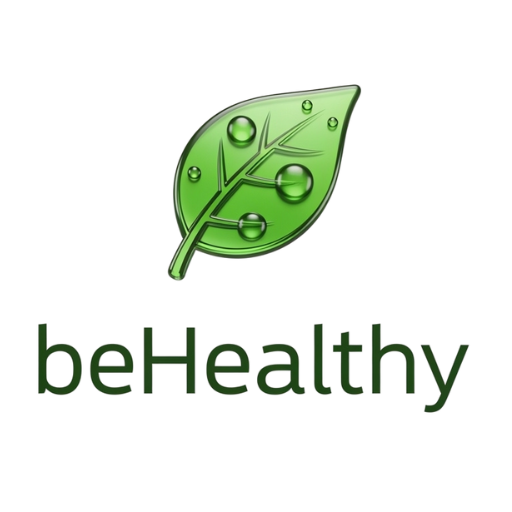

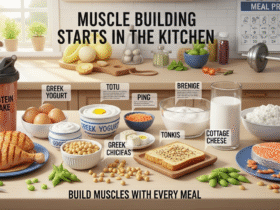
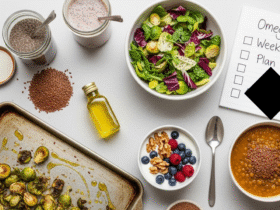

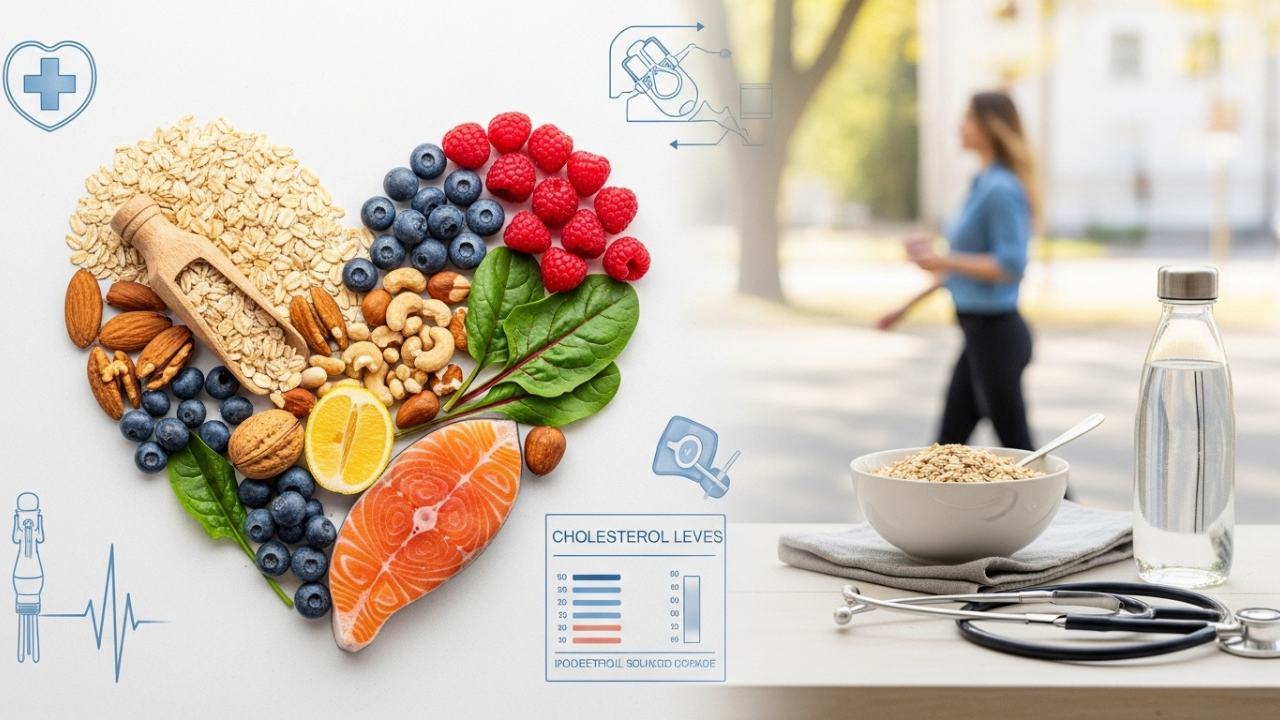


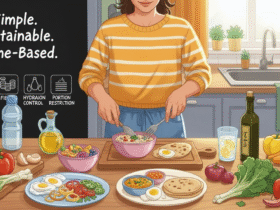

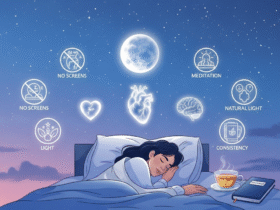


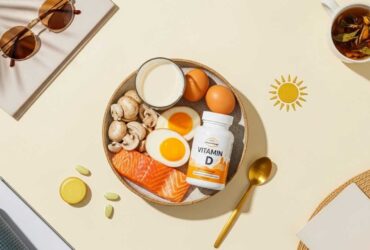
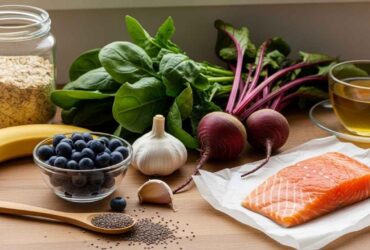
Leave a Reply